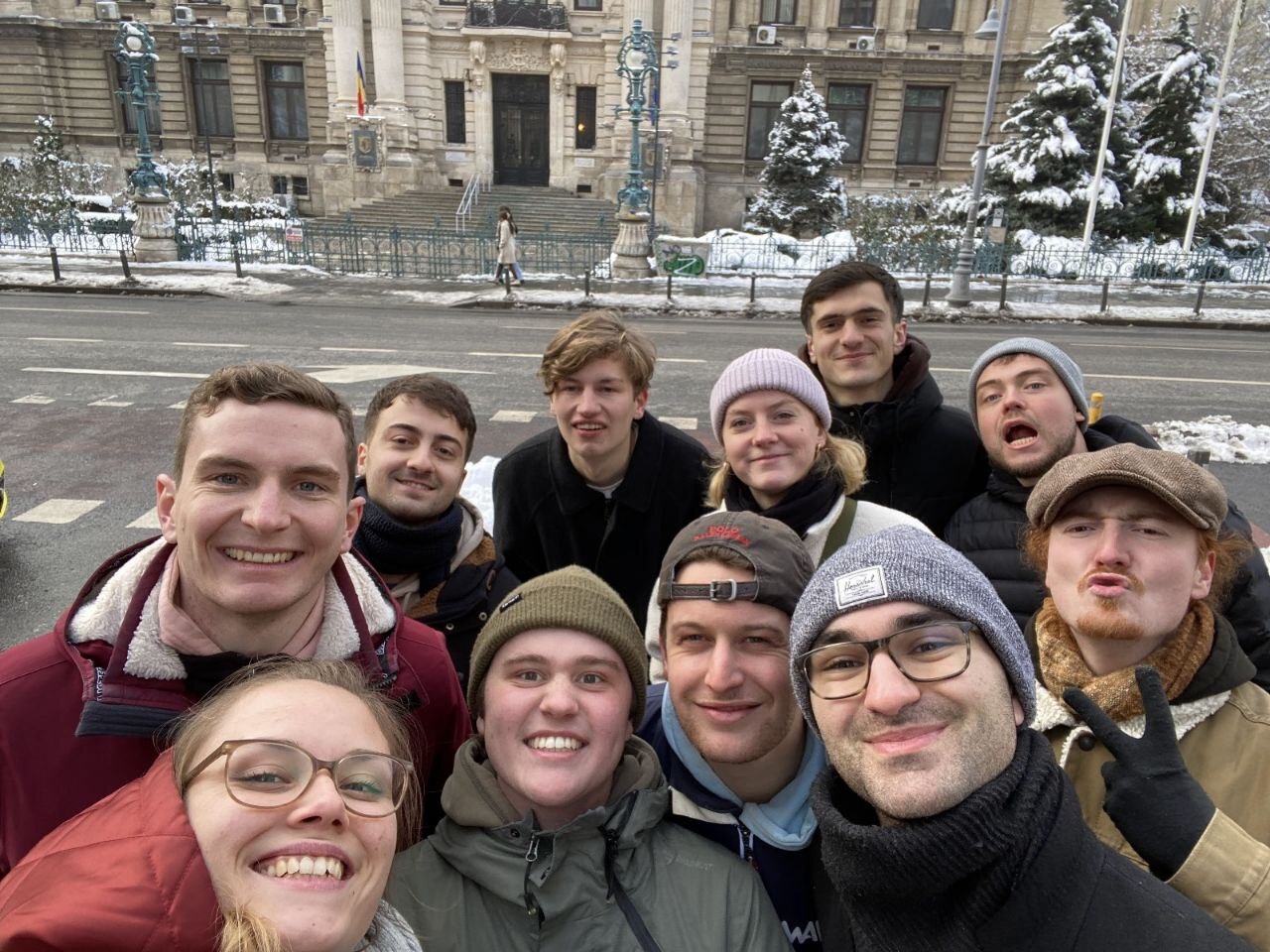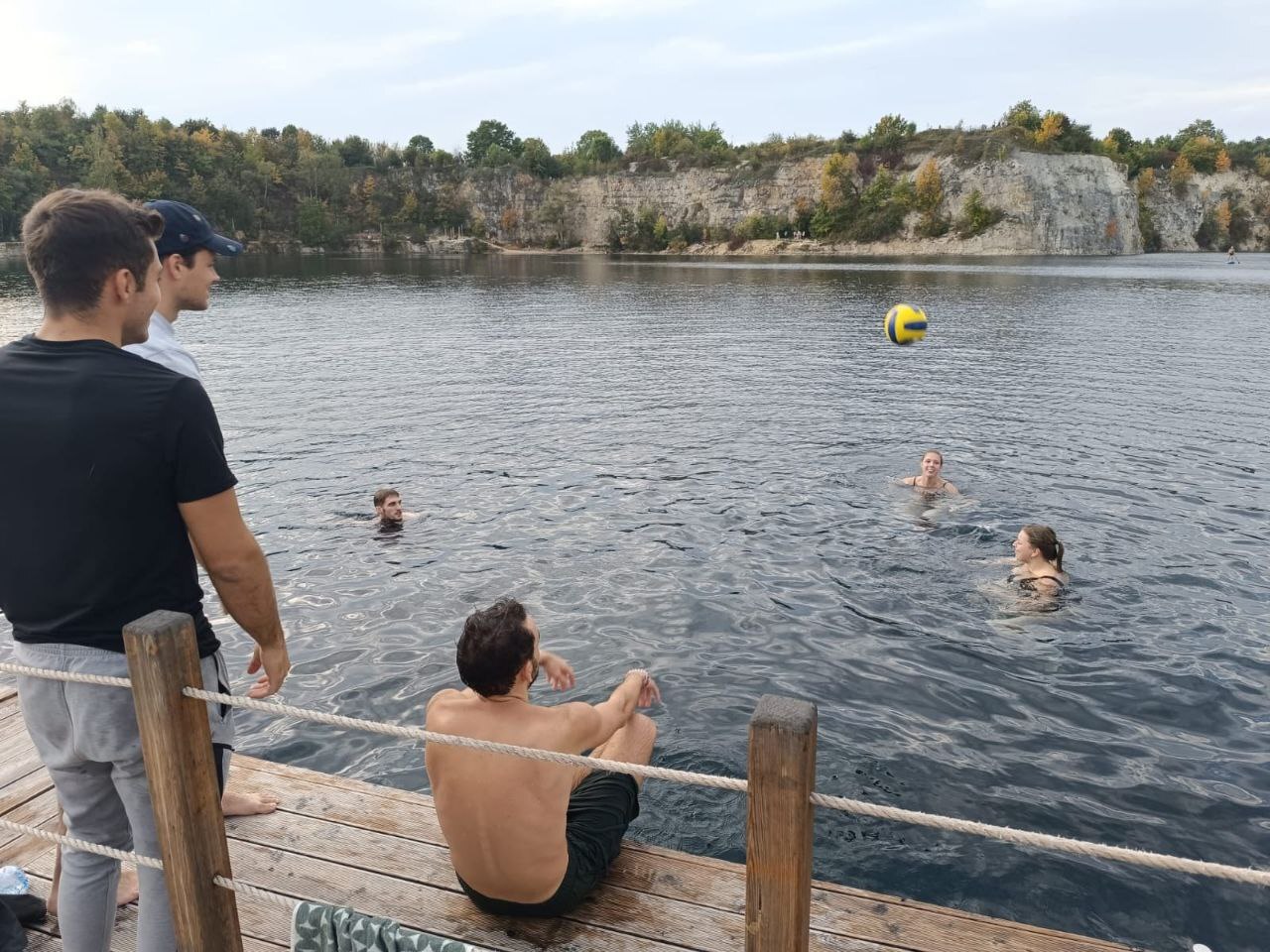Nothing major, is it?
During your bachelor you get two modules where you can decide to do almost anything you want to get credits for your study. Yes, it is the magical study space-time relation called your minor space. Those who have done their minors already know that it can range from the easiest to the hardest courses they took and from the most fun they had to the most dreading days of their bachelors. We asked four students to tell us the story of their minor.

Casper Hamster
A Dutchy in Prague. An experience I would recommend everybody to try. A way to broaden your horizon, a way to get in contact with other cultures, and most importantly a way to have a lot of fun. As of now I am a fourth year student and member of Scintilla, and although Enschede is a lovely city, I always love trying different things and new experiences. Last year I did a student team called Project MARCH in Delft, and after that I wasn’t quite ready to go back to Enschede. So I took the opportunity the University provided, and applied for a minor abroad. Prague seemed like a beautiful city with an active nightlife so it was an easy choice for me. A lovely minor coordinator at the University of Prague was very helpful, so in my experience it was an easy process. Before March of last year, I knew that I was going. September the 18th was my first day, and it was exciting but also nerve wrecking. I had arrived the Sunday before in a dorm in which I had to share my bedroom with some other guy. But practically I knew nobody. Then of course the Erasmus magic happened. There were games, parties, trips and so much more. I knew after that first week that my stay would be fun. Soon I had to chose my courses, something which didn’t go as smoothly as I was used to in the Netherlands. I eventually settled on some electrical engineering, computer science and a little bit of philosophy. As Prague is a very lively city, and the first couple month of fall this year were very warm, it was a perfect time to explore the city and to meet new people. The fact that Prague worked with semesters instead of modules helped me find time for all this fun at the start. Soon a group of what would become friend was formed. We travelled around Central Europe and had some great times. Around December Prague was hit with the most snowfall since 1987, and it became a real winter wonderland. Around that same time it was time for me to hit the books, but there was always time for some pleasant distractions. In the end I still wasn’t done with Prague. I could have easily stayed an additional semester. The goodbyes were hard, but it’s an experience I will forever cherish.
Vera van de Ven
When deciding to study abroad I did not really know what to expect. I did not plan to go abroad but when I joined the information session with some friends (heheh hi Hidde sticker) I got interested. So some months later I was signing my learning agreement to study in Kraków. In Poland I lived in the dorms of the university. I shared my room with a Chinese girl who started her studies in computer science. It was her first time abroad. There was quite a language/culture barrier, this is one of the reasons we didn’t really get along. Because of this I was not in my dorm a lot. With the new friend group we formed there we had dinners each monday and sometimes 1 or 2 more times on random days in the week. We were with 3 Italians, 1 German guy, 1 Spanish girl, 4 Dutch, 1 Belgian guy and 2 french. In the beginning of october the weather was amazing. Some days it was even 25°C outside, perfect for a swim in the nearby lake. Even though the water was cold, some of us went into the lake. Later in november and december it started to freeze as expected. The lowest temperature we reached was -17 in january. On the weekends we planned some trips like visiting Warsaw, Gdansk and Zakopane. This last one was my favorite trip. Together with 3 others we went hiking for the weekend in the Tatra mountains in the snow. For this trip I managed to buy leather second hand hiking shoes, this is one of the best purchases I made there. We had house parties during the week which was a lot of fun (obviously :) ) During my exchange my flatmates visited for a few days. Here I was a tourist again for a few days. I had some classes during the day so we mostly went for drinks and places to visit during the afternoon/evenings. They also got to experience the regular international club night on monday which was amazing. Besides my flatmates, my parents and sisters also visited. They were really happy I decided to study abroad, now they had a good reason to go on a city trip in the autumn break.
And that’s a short summary on what I did on my exchange to Poland =)

Bjørn de Vries
When starting the Energy Transition Perspectives (ETP) minor I did not know what to expect. The ETP minor consists of 5 blocks of two weeks, the first block provided surface-level information about the global perspective of the energy transition, this included geology, history, economic- and sociological factors. The fifteen lectures were given by ten different teachers and guest lecturers, which made it hard to ask questions about a past lecture and the corresponding exercises as that would require mail contact with the lecturer of that specific lecture. The second block was about electricity, something I (as an EE student) looked forward to, but the most in depth we would go was Ohm’s law, power and energy. The focus was more on smart use of (renewable) energy, to our disappointment. This block was better coordinated then the first, and there was an assignment that required us to simulate the charging of an EV within a certain time period with different energy goals in mind. The assignment was actually quite fun but somewhat frustrating at times. The third block gave more insight into different types of renewable energy and how much each solution costs and how practical they are in different areas of the world and in different seasons. This block involved some basic chemistry and quite some calculations. It also had an assignment involving more programming where the simulated energy and heating demands of a city in both the summer and winter needed to be met using solar- and heat panels. The fourth block gave information about different methods of storing electrical- and heat energy, this block was quite overwhelming like the first block as there were a lot of terms and a lot of information like power- and energy density and storage duration for every storage solution that it became a lot to remember. The assignment of this block consisted of making a short video where we had to explain the best storage solutions for the Netherlands, this was quite underwhelming compared to the two previous assignments. The last block was mostly psychological factors and to be frank, was the least interesting one of all the blocks. The first week consisted of lectures and the exam, while the second week consisted of a couple of workshops and a group essay. This block had a distinct lack of answer sheets for the exercises and the practice exam, which the other blocks would (partially) provide. The ETP minor is quite new, which became clear during the first week when the lecture slides were uploaded after the lecture was done, as the slides could sometimes be subject to change until the morning of the lecture. Overall the ETP was quite enjoyable but had some quirks that still need to be worked on.
Askar Sadykov
Hey there, I’m Askar Sadykov, and I’ve got a couple of exciting minors to share with you. First up was Aerospace Management and Operations, a part of the HTHT program. It’s bundled with Aircraft Engineering, but I stuck with the first part. Then there’s my second minor from the BIT program: Software Development. These minors are packed with interesting content for students willing to explore new fields beyond their main study areas. First off, Aerospace Management and Operations. This one’s all about the aviation industry from the standpoint of management and business. It covers a wide range of topics, like airport and airline industries, revenue management in the context of aviation, and, finally, maintenance. Plus, you’ll explore how the aerospace sector impacts society and the environment. If you’ve ever dreamt of working in aviation, this minor is suitable for you. What’s good about this course is its immersive approach to learning. You’re not just studying airline management theory; you’re stepping into the role of an airline manager through an airline simulator game. Picture yourself making crucial decisions on aircraft acquisitions, route planning, marketing strategies, HR management, budget allocations, and even stock issuances. These decisions will influence the future of your business and provide you with some experience of management. Now, let’s talk about the Software Development course. If you’re a coding enthusiast, this one’s for you. It’s like taking your programming skills to the next level. You’ll dive into software design and its implementation using the Java programming language. The course offers two projects: one for System Design, where you have to implement UML diagrams based on the business case, and one for programming, where you have to make a game with clients and a server. In my case, I had to code the Exploding Kitten Game. For Electrical Engineering students, these courses expand your interests beyond your main field. However, the Aerospace Management and Operations course teaches you the basics of management, which could be handy later on. Similarly, Software Development helps to get better at coding and making software, skills that could also be useful for Electrical Engineers. In conclusion, exploring minors like Aerospace Management and Operations and Software Development is a great way to broaden your academic interests and skills. These minors not only broaden your area of knowledge but also give you skills that can be applied in different fields and might turn out to be helpful in the career of an electrical engineering.
